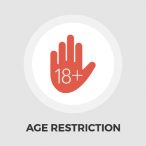Does Porn Need an Age Verification? Interview with an Expert

Can Age-Verification on Porn Sites Protect Both Kids and Privacy?
Yes! I recently saw a fiery UK headline proclaiming that, “Age-verification for online porn will be a security disaster.” As a privacy lover, I was curious as to whether the concerns it raised are legitimate. I turned to expert Ernie Allen, who for years has been working in the UK, the US, and elsewhere to encourage a workable age-verification system that would limit porn website access to those over 18. He graciously answered my questions.

Q: Whom do you represent? A: I have no official role. I am not speaking on behalf of the UK government or anyone else. I am simply enthusiastic about the age-verification concept. I formerly headed up the National Center for Missing & Exploited Children (NCMEC) for 23 years.
Q: Is the age-verification movement about censorship of unacceptable porn? A: No. From the beginning, the development premise has been twofold: (1) this has to be about child protection, not sorting particular content; and (2) this has to protect the privacy of the adult porn user.
Q: The UK seems poised to adopt age-verification. Before we get to the nuts and bolts of the system proposed, can you summarize the political process? A: The UK went through a complex consultative process with broad participation by all sides of this issue, including the pornography industry itself. As a result the UK’s age-verification proposal was announced in the “Queen’s Speech” last spring (2016) and was introduced into Parliament in July. The bill passed the House of Commons in December and is before the House of Lords, where it appears that it will pass.
Q: How can you verify someone’s age without first determining their identity? A: Some claim you can’t, but British experts are now confident that the technology exists to do this accurately and effectively, and this is the plan it appears they will implement. It is based on third-party trusted verification through using existing robust data sources; i.e., credit card, mobile ID, data analysis companies, etc. Thus, the operator of the site will never know who is accessing the site, only that this is someone who is at least 18. The British call it “pseudonymous” identification. It is more complicated than that but the UK has developed the technology for a credible, effective, inexpensive solution, and it is being examined and monitored by other countries with whom I have spoken.

Q: How do you hold non-compliant sites accountable, given that the vast majority of these sites are not located in the UK? A: The bill currently before the House of Lords gives the regulator the authority to direct UK ISPs to block access to sites that are “persistently noncompliant.” So, there are teeth.
Q: How will the system deal with Twitter and other social media sites where many kids today access adult content? A: The House of Lords committee is now grappling with that and other questions. Nonetheless, I am confident that this will become law and will be adapted and improved as we learn more about what works and what doesn’t. Also, I am confident that this will be replicated around the world.
Q: Is there opposition? A: Despite the broad consultation and even the support of many pornography industry companies, there is still opposition from some as is reflected in that article you sent me.
Q: Is this system in place anywhere? Is it working? A: Yes, age-verification is already being used in the US and elsewhere for controlling access to online gambling. With respect to adult content, similar systems are already in place in Germany and elsewhere. They keep vast numbers of children from being able to access these sites and “adult-content.”
Q: What about adult content access in the US? A: I have engaged in extensive conversations with political, industry and other leaders about age-verification. Our primary challenge is the Supreme Court’s 2002 decision in Ashcroft v. ACLU, which invalidated much of the Child Online Protection Act (COPA). In its decision the Court said that it is a legitimate government function to protect children from inappropriate content online, but that it must be done using “the least restrictive means available.”
In his opinion Justice Anthony Kennedy wrote, “Filters will do the trick.” Fifteen years later we know that Justice Kennedy was overly optimistic. Filters do not do the trick. According to 2015 Pew research, just 39% of parents utilize filters or parental controls, and only 16% employ them on the mobile devices where modern children increasingly access adult content. McAfee, Intel’s security company, reported that 4 out of 5 parents who install parental control software never actually turn it on. Many parents have no idea what their kids are seeing. Parents need industry support. In my view, an approach like age-verification, which is already being used in this country for controlling access to online gambling sites, is in fact the least restrictive means available for government to address this problem. It doesn’t deny adults access, and it can now be done in a manner that protects the privacy of users. My hope is that we can emulate and build on the British experience and replicate it here.
Q: What are the system’s limitations? A: It’s certainly not a panacea. It doesn’t obviate the needs for more research or a public health-based approach. Neither do I argue that the model of default filtering, in place in the UK at Sky Broadband, the so-called “Sky Broadband Shield,” should not be adopted and implemented by leading companies here as well. However, age-verification is a compelling and achievable way to begin to address the adult-content inundation of the developing brains of younger and younger children.
Q: Thank you for your time Ernie.
Written by Marnia Robinson a former corporate attorney who writes about the effects of evolutionary biology on intimate relationships and blogs on Huffington Post.
What are your thoughts about age verification? How do you think it will impact kids and social media?
Leave your comments below.
Disclosure Policy:
- The SASH blog is written by our active members and published by SASH. For questions about this blog, please contact executive director {at} SASH {DOT} com.
- This blog does not accept forms of cash advertising, sponsorship, paid insertions or other forms of compensation for publication of content.
- SASH is not compensated to publish blogs including those offering opinion on books, therapies, products, services, websites and various other topics. All blog authors must accurately reflect any compensation received related to or because of their blog posts. Blogs that review a book or “product” (including treatment facilities) will state any interest of the author so that the reader can easily discern that the author has said interest or receives related remuneration. Authors will be held responsible for ensuring that portions of their blog that are advertising in nature will be distinguishable by the reader from other content.
- This policy is valid from 16 January 2017.
